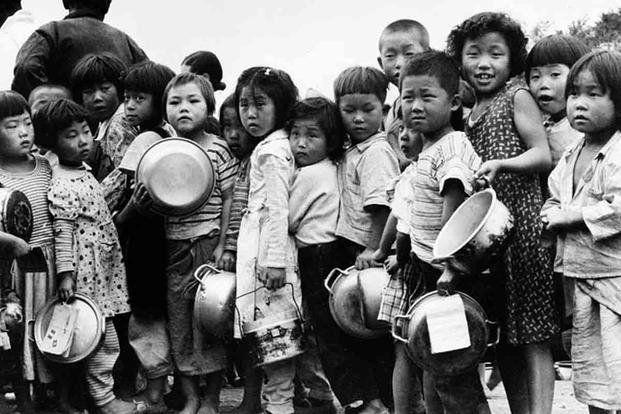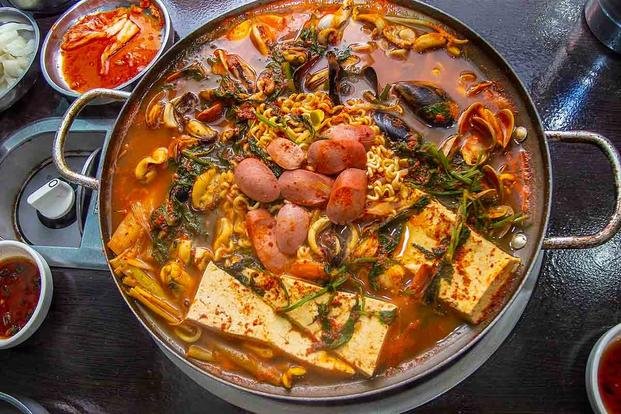Necessity is the mother of invention. In the aftermath of the Korean War, necessity created an enduringly popular fusion of Korean vegetables and spices with shelf-stable American processed food, budae jjigae, or "Army Base Stew." It's a dish that started its life as a means of survival, but continues to be sold across South Korea because it's actually pretty good.
The Korean War was one of the most brutal conflicts in military history. It destroyed nearly every building in North Korea and decimated South Korea. The economies and means of subsistence for people on the entire Korean peninsula were effectively destroyed within the first year of fighting.
Read: The Korean War: Everything You Need to Know
As a result of being displaced from their homes, either fleeing the conflict zones or being forcibly uprooted, Koreans began to starve. South Korea's economy was already a fragile one, ruled by a western-backed dictator after emerging from 35 years of Japanese colonial rule. The war disrupted the way millions lived and fed themselves and their families.
As the war dragged on, Korean civilians began to flock to American military installations. Koreans spread rumors about the abundance of food on the bases, that there was so much, the GIs would throw away food they couldn't finish. Korean civilians would go through the food waste, pulling out edible scraps. Eventually, Koreans bought whole bags of discarded American food waste, essentially garbage bags filled with a mix of leftover food. They then added it to large stews.

These stews were called ggulgguri juk, or "Piggy Porridge," and were often sold by the bowlful outside of U.S. military bases. These bowls of soup were a hodgepodge of desirable food scraps, but could also include things that weren't so desirable, like cigarette butts. Even the piggy porridge was better than starving to death,
When the war ended, Korean civilians no longer had to rely on discarded food, but meat would be hard to find in Korean markets for a long time after, so they went back to the American bases.
There, they found U.S.-made processed meat products that weren't technically available to them, but could be purchased if they knew the right people. Products like Spam, hot dogs and ham could be bought from Korean women with access to American troops, who could buy the items from post exchanges.
A thriving black market of salty processed meat products grew near the U.S. bases, because ingredients like Spam created the perfect soup base for Korean vegetables. This black market continued for decades after the war ended. It became so widespread that the government of South Korean President Park Chung-Hee made Spam smuggling an offense punishable by death.
Still, though associating with U.S. troops was frowned upon by Korean society, many Korean women smuggled Spam to make dishes with the meat. An early iteration of the dish was stir-fried, with Vienna sausages, cabbage and onions. A Korean woman named Heo Gi-suk, who worked on one of the bases as a cook, claimed to be the first to turn budae jjigae into a stew.
Heo and other Korean workers would cook for the U.S. Army by day, then take leftovers home. She fried the meat with rice. Some government workers suggested she turn it into a soup, so she added a salty anchovy broth to the mix. Heo later started her own restaurant, Odeng Sikdang in Uijeongbu, with this Army Base Stew as the central offering.
There's no one definitive recipe for budae jjigae, but most include Spam, hot dogs, soup noodles, kimchi, and gochugaru or gochujang (spicy Korean red pepper flakes and paste, respectively). Other ingredients can include macaroni, ground beef, scallions, rice cakes, instant ramen, baked beans and a host of others, depending on the restaurant. It's usually topped with slices of American cheese.
South Korea has tried to rebrand it as "Uijeongbu-jjigae" to try to distance the delicious soup from its dark past, but its popularity as comfort food makes that effort all but impossible. Many Koreans have a contentious relationship with it, given the grave nature of its origins, but it's hard to give up on a popular reminder of a war that has otherwise been forgotten.
-- Blake Stilwell can be reached at blake.stilwell@military.com. He can also be found on Twitter @blakestilwell or on LinkedIn.
Want to Learn More About Military Life?
Whether you're thinking of joining the military, looking for post-military careers or keeping up with military life and benefits, Military.com has you covered. Subscribe to Military.com to have military news, updates and resources delivered directly to your inbox.
















